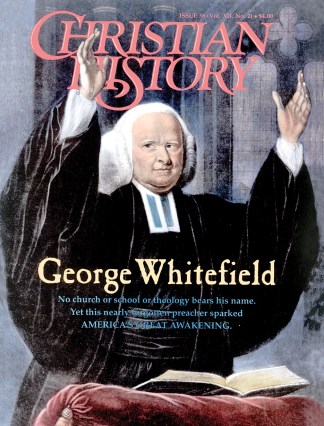“I believe it is God’s will that I should marry,” George Whitefield wrote to a friend in 1740. But he was concerned: “I pray God that I may not have a wife till I can live as though I had none.”
That ambivalence—believing God willed a wife, yet wanting to live as if without one—brought Whitefield a disappointing love life and largely unhappy marriage.
First Love
When 25-year-old Whitefield met young Elizabeth Delamotte, he struggled to reconcile his love for Christ with the strange new sensation he felt toward her. Sailing to America in 1739, he resolved to put her out of his mind. But when he arrived in Georgia, a letter from her awaited him.
“What room can there be for God,” he wrote her, “when a rival hath taken possession of the heart?” Still, “I could almost drop a tear, and wish myself, for a moment or two, in England. But hush, nature.” Whitefield’s Journals soon report “unspeakable troubles and anguish of soul.” Finally, he decided to marry.
His proposal letter to Elizabeth began by cataloguing the sufferings she would endure as his wife, concluding with, “Can you, when you have a husband, be as though you had none, and willingly part with him, even for a long season, when his Lord and Master shall call him forth to preach the Gospel?” He smothers romantic notions: “I write not from any other principles but the love of God.… The passionate expressions which carnal courtiers use … ought to be avoided by those that would marry in the Lord.”
As one historian put it, “Had he tried to design his proposal in such a way as to ensure its failure, he could hardly have done better.”
Love Triangle
Though his proposal was rejected, Whitefield still felt called to marriage. When he mentioned this to fellow evangelist Howell Harris, Harris discerned “an amazingly providential solution.”
Harris had fallen in love with one Elizabeth James, a Welsh widow in her mid-thirties. Though her affection for him was equally strong, he, like Whitefield, wanted “no creature between my soul and God.” He had labored to break off the relationship but failed time after time.
Harris arranged a meeting between Whitefield and Elizabeth James. Whitefield was impressed with her devotion to Christ, so both Harris and Whitefield wrote her, suggesting an exchange of suitors.
She was furious, writing Harris, “If you were my own father you had no right of disposing me against my will.” Still, she didn’t close the door to Whitefield, and as they corresponded over the next months, Whitefield became convinced the match was right. James “objected much,” Harris reported, because of “her regards to me & that she could not help it still.”
Yet, four days later, she agreed to marry Whitefield. At the wedding a few weeks later, Harris gave away the bride.
Whitefield had vowed that he “would not preach one sermon less in a married than in a single state.” During the week-long honeymoon in Elizabeth’s home, he preached twice a day. From then on, she usually remained in London during his travels. Once he was gone for two years.
But the obligations of marriage couldn’t help but constrain Whitefield’s ministry. Within two months of his wedding, he wrote, “O for that blessed time when we shall neither marry nor be given in marriage, but be as the angels of God.” Years later he warned a young man, “Marry when or whom you will, expect trouble in the flesh.” After Elizabeth’s death, though, he said, “I feel the loss of my right hand daily.”
Elizabeth James’s letters show it took her ten years to get over Harris. She suffered four miscarriages, and her only child with Whitefield, a son, died when 4 months old. A man who lived with the couple during their last years put it well: “He did not intentionally make his wife unhappy. He always preserved great decency and decorum in his conduct towards her.”
Mark Galli is Associate Editor of Christian History.
Copyright © 1993 by the author or Christianity Today/Christian History magazine.Click here for reprint information on Christian History.










